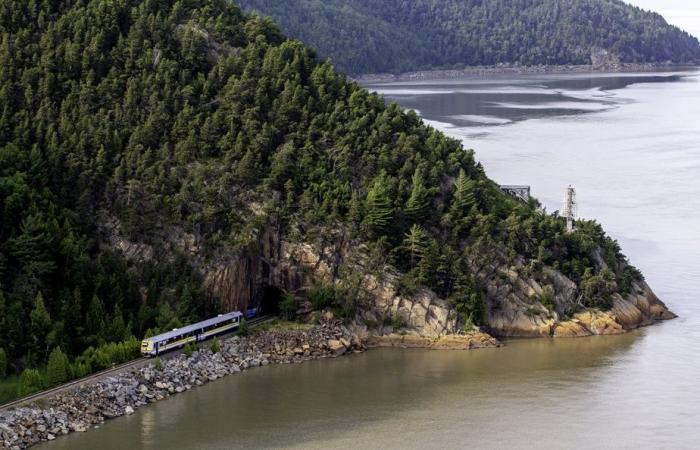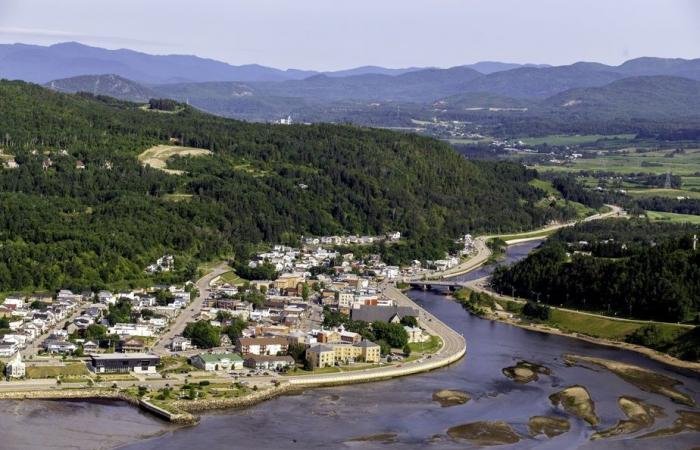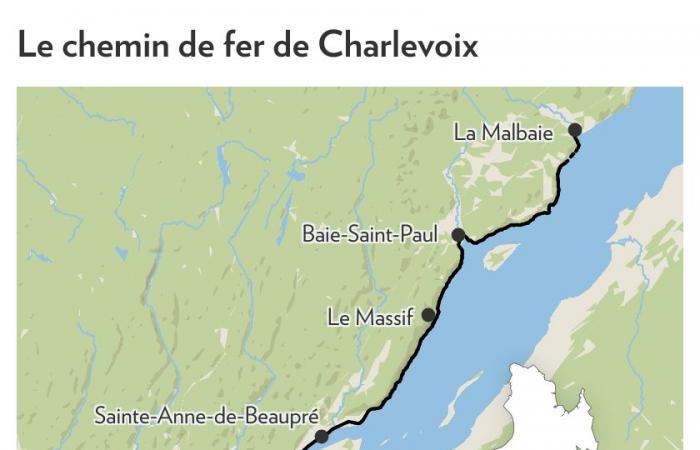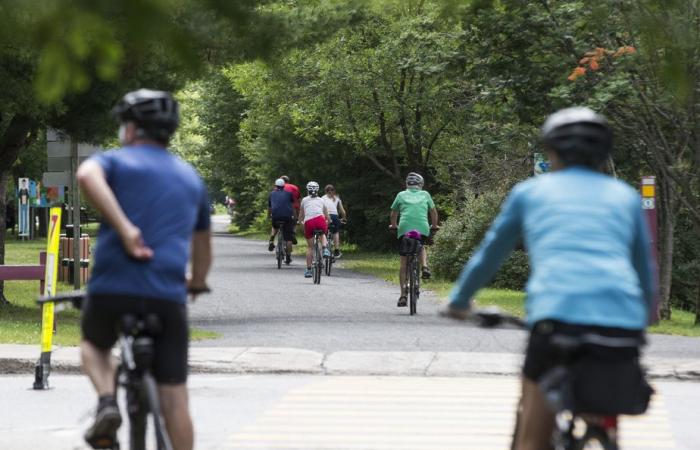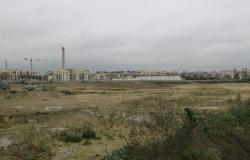(Quebec) The owner of the railway which connects Quebec to Charlevoix along landscapes of breathtaking beauty is clear: there is no question of dismantling the railway to create a cycle path.
Published at 5:00 a.m.
What you need to know
- In 1996, the first tourist train in Charlevoix, Le Tortillard, ceased operations due to lack of profitability.
- In 2009, the Le Massif Group acquired the railway and launched the Train de Charlevoix two years later.
- Last fall, after a new funding crisis, the operator asked for $350,000 from local municipalities and Tourisme Charlevoix, which was refused.
- On December 20, the operator announced the end of the train’s activities, making the future of the railway uncertain.
The idea of creating a sort of P’tit train du Nord between Quebec and La Malbaie has been circulating in recent weeks. In mid-December, Réseau Charlevoix administrators announced the end of the tourist train, which had been in operation for 13 years.
PHOTO YVES TREMBLAY, THE EYES OF THE SKY, ARCHIVES SPECIAL COLLABORATION
The town of La Malbaie
The project, which was led by Daniel Gauthier, owner of Le Massif, was not profitable. Local elected officials refused to grant other public funding. The train operator announced on December 20 that it was ceasing operations and letting go of its 55 employees.
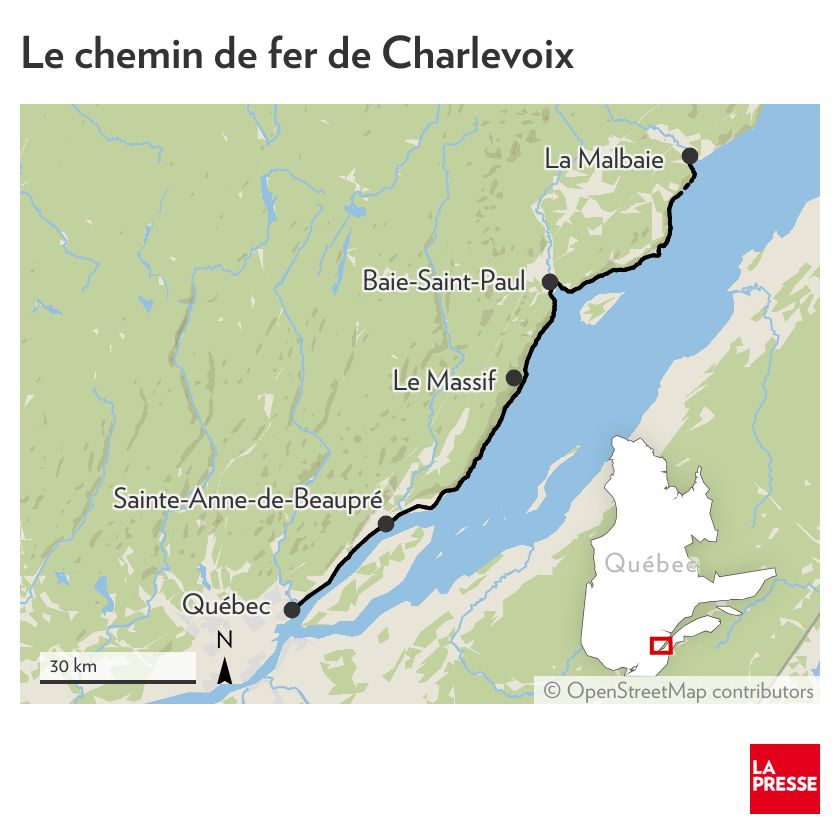
What to do with the 148 km railway now without trains? Citizens and the newspaper The Charlevoisian raised the idea of making it a cycle path, like the many that have been installed across the country on former railway rights-of-way.
This trail would run dozens of kilometers along the mountainside along the river in unique landscapes and would allow walkers, runners, cyclists and skiers to avoid Route 1381. But it would be better to forget about this idea immediately, according to the railway owner.
The railway [est] in very good condition, always maintained. To think that we are going to tear up the tracks and put in a cycle path is unthinkable.
David Blair, president of Charlevoix Railway
Chemin de fer de Charlevoix has owned the railway since its purchase by Daniel Gauthier in 2009. As recently as last March, Quebec granted 4.2 million for the maintenance of the rail and the operation of the tourist train.
David Blair, who is a lawyer specializing in railway law, says he still hopes that an agreement will allow the return of the tourist train, as early as next summer.

PHOTO TAKEN FROM THE COALITION AVENIR QUÉBEC WEBSITE
David Blair, left, along with Transport Minister Geneviève Guilbault, during an investment announcement last March.
But whether he comes back or not, for him, it is essential to maintain a railway vocation. According to him, it would be insane to “tear up” rails at the very moment when Quebec is investing millions to repair the railways in Gaspésie or Beauce.
“Tomorrow morning, we could theoretically operate a commuter train from Côte-de-Beaupré to Palais station in Quebec. The infrastructure is there, the trains are there. We are working on that,” said the president of Chemin de fer Charlevoix. “There is a large residential complex in the Sainte-Anne-de-Beaupré region,” he adds. And with the tram project in Quebec, it’s like a no brainer. »
A golden opportunity, according to Vélo Québec
For the Vélo Québec organization, the idea of installing a linear park in the railway right-of-way must be analyzed by the government.
“In the seconds following the announcement that the train had stopped, we saw the opportunity in our minds. This is truly an incredible opportunity. Cycle paths of this type, with these landscapes, there are not many in the world,” notes the CEO of Vélo Québec, Jean-François Rhéault.
The Charlevoix railway runs in Quebec in an industrial sector, then along Route 138 before branching off towards the river from Beaupré to La Malbaie.

PHOTO DOMINICK GRAVEL, ARCHIVES LA PRESSE
Jean-François Rhéault, CEO of Vélo Québec
It is certain that a train is a tool for sustainable development, but if the railway were to no longer be used, I think we would have to think seriously about a linear park.
Jean-François Rhéault, CEO of Vélo Québec
Vélo Québec cites in particular the case of the P’tit train du Nord, in the Laurentians. This former railway line receives almost 2 million visitors (walkers, runners, cyclists, cross-country skiers and snowmobilers) per year.
The MRCs in the sector do not own the railway right-of-way, but rent it from the Ministry of Transport. Theoretically, therefore, a return of rail would not be impossible if an essential project saw the light of day.
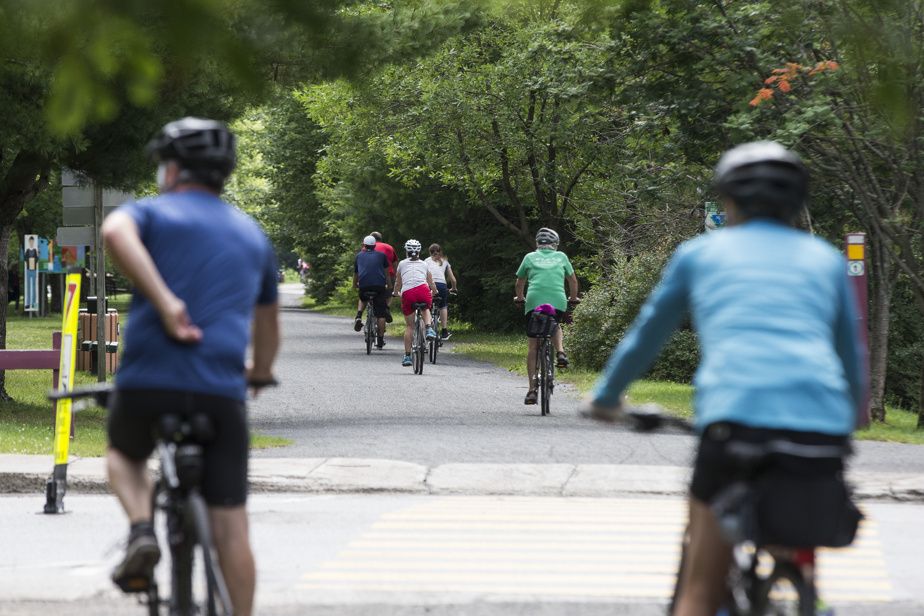
PHOTO HUGO-SEBASTIEN AUBERT, LA PRESSE ARCHIVES
The P’tit train du Nord is a 230 km multifunctional trail in the Laurentians.
Charlevoisians are already carrying out a project for a cycle path on a portion of the rail, between Baie-Saint-Paul and Saint-Joseph-de-la-Rive. The Sentier de la Rive project would coexist with rail. “There is a desire to give the river back to the people of Charlevoix,” notes Claude Belley, president of the Sentier de la Rive Group.
What does he think of the idea of a linear park from La Malbaie to Quebec on the railway line? The subject is delicate. Mr. Belley knows that several stakeholders are working hard to bring the tourist train back to life.
“But we understand that we would end up with an extraordinary infrastructure, from Montmorency Falls to La Malbaie,” says Mr. Belley.
It would become an exceptional product, easier to produce than with a train. It’s expensive to coexist with the train, there is infrastructure to build to go over the rail in certain places, because the wall is too close.
Claude Belley, president of the Sentier de la Rive Group
Mr. Belley and his team are looking around the world to see if railway tracks have already been covered with a removable track. This solution would be less definitive than a pure and simple removal of the rail. “But basically, we wait, we can’t do anything else,” he said. We are careful. »
In Quebec, in the office of the Minister of Transport, Geneviève Guilbault, it is indicated that “it is still too early to decide on the future of things”.
“Meetings will take place over the coming days between the stakeholders to determine the next steps. It should be remembered that, unlike other cycling development projects which would use an abandoned railway right-of-way, that of Charlevoix linking Quebec City via Côte-de-Beaupré is viable and operational and meets federal standards for the transport of goods,” adds the firm.
1. Note that a Green Route project is in development for Charlevoix. The cycle path would pass inland between Baie-Saint-Paul and La Malbaie, notably on sections of the 138.

